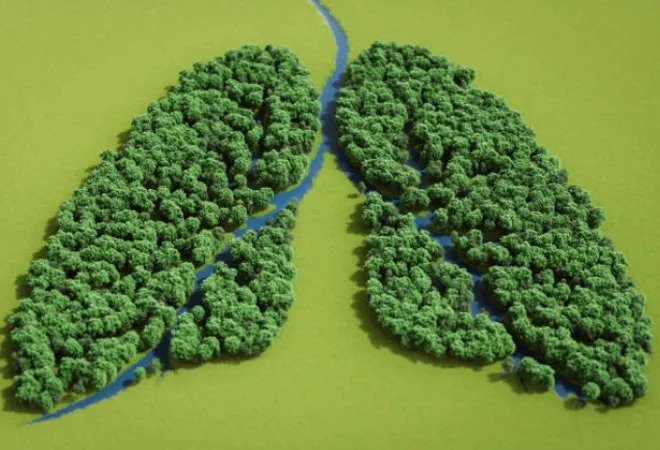-
CENTRES
Progammes & Centres
Location
The sustainable development, climate action and COVID-19 recovery strands of the common agenda need to be better aligned to target the most vulnerable

This piece is part of the essay series, Towards a Low-Carbon and Climate-Resilient World: Expectations from COP26
The COVID-19 pandemic has severely impacted ongoing collective efforts on climate action. These efforts underscore the need for equal access to resources, judicious use and planning, strengthening critical infrastructure, and enabling vulnerable communities in the face of adversity. The multidimensional crises facing the international community, compounded by the COVID-19 pandemic, make it more urgent for countries to adopt forward-looking policies to act faster on sustainable transitions, adaptation and resilience, and provide impetus to recalibrating health systems for greater efficiency and quality. To this end, the 2021 United Nations Climate Change Conference of Parties (COP 26) in Glasgow, provides an opportunity for nations to address post-pandemic recovery through the lens of sustainable development.
Research has shown that Asia is the continent most affected by weather-related disasters—some 2,843 of such events were recorded between 1990 and 2016, affecting 4.8 billion people and taking 505,013 lives. Deaths from natural hazard-related disasters are largely concentrated in poor countries.<1> Higher temperatures brought about by climate change, pose profound threats to occupational health and labour productivity, particularly for people engaged in manual, outdoor labour in hot areas. Also, labour capacity decrease due to climate change is among the highest in the Southeast Asia region. Climate information services for health—i.e., targeted or tailored climate information, products, and services that will aid the health sector—were found to be the lowest in Southeast Asia.<2>
By 2030, irreversible negative impacts on health because of climate change could undo much of global poverty reduction strategies and push over 100 million people into extreme poverty. Climate change will worsen emerging health challenges like cardiovascular diseases and respiratory illnesses, which are linked to air pollution. A higher frequency of extreme weather events, rising sea levels, rising temperatures, and changing patterns of precipitation will also result in negative health outcomes.
Higher temperatures brought about by climate change, pose profound threats to occupational health and labour productivity, particularly for people engaged in manual, outdoor labour in hot areas.
It is expected that climate change will increase health risks associated with extreme weather events, which are becoming more frequent, intense, of longer duration, and have greater spatial extent. Increased UV radiation; increased air pollution; increased food-borne and water-borne contamination; the introduction, expansion or re-emergence of rodent and vector-borne infectious diseases; and the exacerbation of health challenges faced by vulnerable populations are some of the additional risks from climate change. Additionally, extreme weather associated with climate change can damage hospital buildings, cause power and water outages, and disrupt the delivery of healthcare at the frontlines as roadblocks may limit access to supplies and essential services (such as energy and water supply), and obstruct patients’ access to health facilities.
According to WHO, between 2030 and 2050, climate change is expected to cause approximately 250,000 additional deaths per year from malnutrition, malaria, diarrhoea, and heat stress. The direct damage cost to health is estimated to be between US$2 billion and US$4 billion per year by 2030. Communities across the globe are confronting health risks from excessive heat, altering disease patterns, disaster events, and the potentially catastrophic impact of global warming on food and water security. The impact of climate change on human health, however, will not be uniformly spread due to the various degrees of exposure, sensitivity, and adaptation ability of different regions.
Extreme weather associated with climate change can damage hospital buildings, cause power and water outages, and disrupt the delivery of healthcare at the frontlines as roadblocks may limit access to supplies and essential services (such as energy and water supply), and obstruct patients’ access to health facilities.
Determinants of health are impacted by multiple social and environmental effects of climate change that are manifested as degradation in air quality, extreme fluctuations in temperatures, lack of adequate and safe drinking water, food insecurity and insufficiency, and the impedance of diseases. Natural disasters and variable rainfall patterns also affect essential services and medical facilities, and destroy property and food sources.
Extreme temperatures have been directly linked to cardiovascular and respiratory diseases, particularly among the elderly, which are further exacerbated by the rising levels of ozone and other pollutants in the atmosphere. For instance, over 70,000 excess deaths were recorded in Europe during the 2003 summer heatwave; and the long-term exposure to fine particulate matter has been linked with an increased rate of chronic bronchitis, reduced lung function, and increased mortality from lung cancer and heart disease. Furthermore, the number of reported climate-linked natural disasters has more than tripled since the 1960s. With over half of the global population residing within 60 kilometers of the sea, natural disasters and warmer temperatures threaten the loss of lives and livelihoods and could lead to more frequent occurrences of communicable diseases (such as water-borne diseases like cholera and diarrhoeal diseases like giardiasis, salmonellosis, and cryptosporidiosis) and mental health disorders (such as post-traumatic stress disorder).
According to WHO, 87 percent of all COVID-19 vaccines have been administered in the world’s wealthiest countries, while low-income countries have received only 0.2 percent of vaccine supplies. Specifically, less than 1 percent of sub-Saharan Africa’s population have been vaccinated. According to the People’s Vaccine Alliance, the wealthy nations are vaccinating one person every second, while the majority of the poorest nations are yet to administer a single dose.
Equity in COP26 deliberations is even more crucial now given that many components of the landmark Paris Agreement had a 2020 deadline. COP26 is an opportunity to discuss progress on curbing climate change, focus on ‘building back better’ amidst the pandemic, and ensure that the interconnected inequities that mar the two-pronged agenda of resilience and recovery, are also taken into account. However, marginalised communities and civil society organisations will likely have a greater burden of adhering to visa and travel requirements imposed during the pandemic since many countries from the Global South are on the UK’s travel red-list, and many may not be vaccinated in time to attend the in-person climate deliberations. Furthermore, the pandemic's worldwide economic crisis has threatened access to climate financing that developing, vulnerable nations require.
Extreme weather events and health crises will be compounded by the cascading health, economic and social impacts of the COVID-19 pandemic. Beyond commitments to curb GHG emissions, advanced economies should also mobilise financial resources to assist vulnerable countries in meeting their climate objectives, especially during the pandemic. COP26 provides an opportunity to rebuild trust and coordination amongst nations and usher in the political attention and economic commitment required to pursue greater climate action.
The COP26 summit will take stock of nations' promises to decrease emissions under the Paris Agreement. The pandemic has illustrated the importance of quick, targeted and concerted efforts in battling life-threatening crises. The lessons from this experience can be leveraged to fuel climate action, more so since both climate change and the aftermath of the global pandemic bear a common strand of interconnectedness owing to widening global inequalities and greater disparities. The imperative is for the adoption and implementation of a worldwide Green New Deal, along with other systemic alternatives in tandem with a new economic paradigm to rectify unsustainable development policies that threaten ecology, erode environmental protection laws, and undermine labour rights and social security systems. Solving the climate issue requires an overhaul of production, consumption and commerce systems, and human-nature ties.
Beyond commitments to curb GHG emissions, advanced economies should also mobilise financial resources to assist vulnerable countries in meeting their climate objectives, especially during the pandemic.
In parallel, the pandemic has also impacted the renewable energy market for vehicles using solar, battery or electric sources to fuel them. Large-scale investment to boost the development, deployment and integration of clean energy technologies, such as solar, wind, hydrogen, batteries and carbon capture, should be a central part of policy plans to address the pandemic since it will bring the twin benefits of stimulating economies and accelerating clean energy transitions. The deliberations at COP26 offer a great deal of scope to plan and commit to encouraging sustainable development transitions for participating nations.
The COVID-19 experience has perhaps permanently impacted the ‘global solidarity’ narrative. A cursory look at the global vaccine distribution will illustrate the inherent inequities in the system and how little is being done about it. The fallout of the COVID-19 crisis has also laid blows on the building blocks of human development, including income, health, and access to resources. The magnitude of the crisis response should inspire all to address existing and new inequities to mitigate the worst effects of climate change. The sustainable development, climate action and COVID-19 recovery strands of the common agenda need to be better aligned to target the most vulnerable and enable the transition towards a healthier, safer, and sustainable world.
Download the PDF of the report here.
Bhavya Pandey is a Research Intern at ORF’s Centre for New Economic Diplomacy and Oommen C Kurian is a Senior Fellow with the Health Initiative at ORF.
<1> Nick Watts et al., "The Lancet Countdown on health and climate change: from 25 years of inaction to a global transformation for public health", The Lancet (2017)
<2> Watts, “The Lancet Countdown on health and climate change: from 25 years of inaction to a global transformation for public health”
The views expressed above belong to the author(s). ORF research and analyses now available on Telegram! Click here to access our curated content — blogs, longforms and interviews.

Oommen C. Kurian is Senior Fellow and Head of Health Initiative at ORF. He studies Indias health sector reforms within the broad context of the ...
Read More +